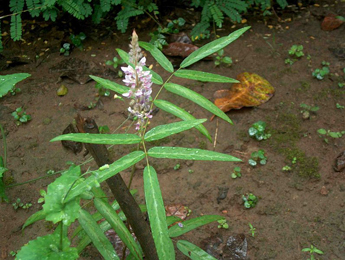Prishniparni, Uraria picta (Hedysarum pictum) - Properties, Benefits & Dosage

Description of Plant
Prishniparni (Uraria picta) is an erect, little branched, perennial herb 0.9-1.8 m in height. Leaves are 20-30cm, imparipinnate with 5-9 leaflets. Leaflets which are on the upper part of the stem are 5-7, (rarely 9), 10-20 cm long, linear oblong, acute, blotched with white, minutely pubescent beneath, base rounded. Leaflets are narrowly lanceolate, 7-25 cm long (lowermost smaller), often variegated, shiny and hairless above, rough hairy below; margins entire, inflorescence a long terminal densely many-flowered spike-like raceme, up to 55 cm long, covered in long whitish hairs, flowers pink, bluish or reddish, fruit 5-9 mm long, folded into 3-6 segments, brown to black in color and turns greyish-white when become old.
General Information
Prishniparni is considered as the one of the most important Ayurvedic herbs. It is one amongst Dashamoola which is group of 10 herbs. This herb offers the countless health benefits for human beings. This herb is packed with the antiseptic, anti-inflammatory, antimicrobial, anti-emetic, aphrodisiac, analgesic, cardiovascular, expectorant and analgesic properties. Use of this herb is quite effective in the healing of fractured bones. All the plant parts are packed with the therapeutic properties. Phytochemical compounds like alkaloids, flavonoids, steroids, terpenoids, phenols and saponins are present in this herb. All these phytochemical compounds possess the numerous biological activists and protect the body from several chronic diseases. It has been found that alkaloid extracts of this herb has the antiarrhythmic, anticholinergic, analgesic, antitumor, anti HIV effects and anti-leukemic effects.
Classification
- Kingdom: Plantae
- Phylum: Tracheophyta
- Class: Magnoliopsida
- Order: Fabales
- Family: Fabaceae
- Genus: Uraria
- Species: picta
Habitat
It is widely distributed throughout India, Bangladesh, Sri Lanka, Tropical Africa, Malay Islands, Philippines, Australia, Africa and almost all parts of Asia. It is grown in dry grasslands and open forests in the sub-Himalayan tract from Kashmir to west Bengal and Assam.
Names
- Latin name - Uraria picta
- Hindi name - Dabra, Pithavan
- Sanskrit names - Prishniparni, Prithakparni, kalashi, Dhavani, Guha, Shrugalavinna, Chitraparni, Anghriparni
- Common name - Dabra
- Tamil name - Sittirappaladai, Kolaponna
Ayurvedic Properties
| Hindi / Sanskrit | English | ||
| Rasa | Madhura, Tikta | Taste | Bitter, Sweet |
| Guna | Laghu | Physical Property | Light |
| Virya | Ushna | Potency | Hot |
| Vipaka | Madhura | Metabolic Property (After Digestion) | Sweet |
Effects on Doshas
It balance the vata and kapha doshas.
Classical Categorization
| Charak Samhita | Sushrut Samhita | Vagbhata |
|
|
|
Ancient Verse about Uraria Picta

The Bhavprakash nighantu, edition of 2010: verse 34-35, page no-286-287.
First shalok states that Prishniparni has various synonyms in Sanskrit that are prithkparni, chitraparni, anghriparni, krosthvitra, singh-puchi, kalshi, dhavni or guha.
Second shalok states that it is useful in balance of all three doshas, hot in potency and madhur in taste and is vrushya, sangrahi. It is beneficial in the treatment of daha, jwar, shwas, raktisaar and trisha.
References
The Bhavprakash nighantu with elaborated Hindi commentary by Padmashri prof. K.C. Chunekar, edited by Dr. G.S. Pandey: verse 34 - 35, edition of 1998: page no- 286 - 287.
Practical Uses of Uraria Picta
- Healing properties of this herbs are quite effective in the healing of fractured bones. It also helps to reduce pain in affected areas.
- Use of this herb is quite good in the treatment of gonorrhea. This herb helps to manage the symptoms like pain in penis, vagina, painful urination, abdominal pain, pelvic pain, pus like discharge and bleeding which are associated with gonorrhea.
- Roots of this herb possess the aphrodisiac properties. It helps to increase the libido and sexual desire. Hence use of this herb is quite good to maintain the good sexual health, stamina and energy in the body.
- This is known to be an effective herb in the treatment of diarrhea. It helps to manage the symptoms like frequent, loose, watery stools, abdominal cramps, abdominal pain, fever, blood in the stool and bloating.
- Expectorant properties of the herb are quite effective in the treatment of the respiratory complications like cough, common cold, asthma and bronchitis. It helps to clear the mucous from the lungs and nasal airways.
- This herb possess the antiseptic properties thus helps treat the various viral, bacterial and fungal infections.
- Use of this herb is good to cure the malarial fever.
- Cardiovascular properties of this herb support the good heart health. These help to maintain the good blood flow in body by dilation of blood vessels. This is also quite effective to maintain the good HDL levels in body and lowers the levels of LDL. Moreover this herb keeps the healthy blood pressure levels in body.
- This herb also acts as antiarrhythmic agents. It helps to manage the problems of abnormal rhythms of the heart like atrial fibrillation, atrial flutter, ventricular tachycardia, and ventricular fibrillation.
- This herb is also packed with anti-cancerous properties. It helps to stop the growth of cancer cells and enhances the growth of healthy cells.
- This herb possess the anticholinergic properties. Hence use of this herb is quite good to manage the problems like depression, anxiety, sleeping problems. Analgesic properties of this herb help to reduce the body pains.
Parts Used
- Roots
Dosage
- Half - one gram

